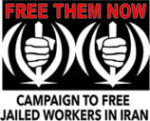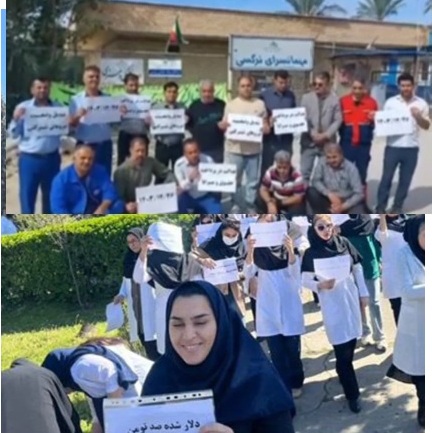Oil Workers and Nurses Issue an Ultimatum
On March 15, third-party workers of the Nargesi unit of the Gachsaran Oil and Gas Company gathered in protest against the Supreme Labor Council’s wage decree, which set the minimum wage at 100 million rials (10 million tomans). The workers demanded their rights and expressed their outrage over this decision. A key aspect of their action was the formation of a general assembly, during which they issued a one-month ultimatum to managers and officials in the oil sector.
These workers declared that if their demands—such as wage increases in line with the current economic crisis and soaring inflation, the complete removal of contracting companies, and the transition to direct employment—were not met within the given timeframe, they would escalate their protests into full-time, daily strikes. They emphasized that they would not return to work under previous conditions until all their demands were fulfilled.
The Council for Organizing Unofficial Oil Workers (Third-Party Workers) reported this protest and called on all third-party and contract workers, as well as other oil sector employees, to unite and resist the wage suppression policies of a government that supports exploitative contractors, the main cause of poverty, misery, and labor discrimination.
Nurses’ Coordinating Council Issues a Warning
On March 14, the Nurses’ Coordinating Council released a statement detailing widespread protests by healthcare workers over the past month. These protests were directed at the government’s wage decree, which they argue severely undermines their livelihood. The council reiterated its ultimatum, stating:
“As we have previously declared, due to the rising exchange rate of the dollar, the real cost of living has surpassed 600 million rials (60 million tomans). Setting a minimum wage of 100 million rials is a direct attack on our standard of living, and we will not remain silent. We insist on our right to a decent life and, if our demands are not met, we will take to the streets with even greater strength and unity in a nationwide and simultaneous protest.”
The council’s report highlighted that over 30 strikes and protests had taken place in the final month of the year across multiple cities, including major hubs such as Tehran, Karaj, Mashhad, Ahvaz, Isfahan, Tabriz, Yazd, Zanjan, Hamedan, Arak, Bandar Abbas, Golestan, Minab, Dehloran, Lordegan, and Baghmalek. Healthcare workers in Gilan and Mazandaran also participated.
In Tehran, large hospitals such as Gandhi, Milad, Loghman, Daneshvari, and Razi witnessed major protests. In Karaj, hospitals such as Kamali, Imam Ali, and Rajaei were among the centers of demonstrations. Widespread protests also took place in Mashhad. On March 14, radiology personnel in Golestan province staged a protest against unpaid benefits, imbalanced overtime compensation, and unfair productivity laws.
Nurses’ Outrage over Broken Promises and Economic Hardships
The nurses’ protests stem from a range of grievances, including unfulfilled promises, unpaid back wages, low salaries and benefits, and the deterioration of their standard of living. Heavy taxation on meager wages has further fueled their anger.
A section of the nurses’ statement reads:
“We, the nurses and healthcare personnel, have so far resisted all threats of fabricated cases, exile, and dismissal through our protests. We have stood united and declared that we have nothing left to lose—we refuse to be slaves or work for free. Wherever we have fought with strength, we have managed to extract at least a small portion of our rights from the corrupt healthcare mafia. Any minor gains we have received so far are the result of our protests and strikes.”
The protests by third-party oil workers and nurses against the government’s wage policies signal the beginning of a broader wave of nationwide protests centred on the cost of living and economic survival.

